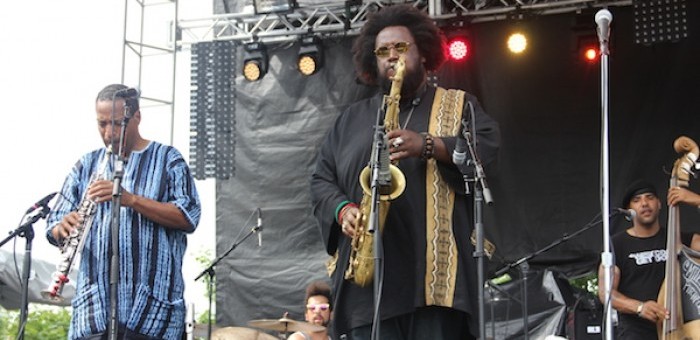Jan 13, 2026 2:09 PM
More Trump-Kennedy Center Cancellations
The fallout from the renaming of the John F. Kennedy Center for the Performing Arts to include President Donald…

Rickey Washington (left), Tony Austin, Kamasi Washington and Miles Mosley perform at the Pitchfork Music Festival in Chicago on July 17.
(Photo: Brian Zimmerman)That admixture clearly made an impression on Pitchfork fans, who lined up by the dozens to get his Washington’s autograph after the set. Just how big that impression will grow, however, is still in the air.
What we can count on is the saxophonist’s eagerness to lead the changing of the guard, a notion borne out in the lyrics to “The Rhythm Changes,” which the band played with fierce urgency: “Our work, our triumph, our glory/ Won’t worry what happened before me/ I’m here.”
Thundercat, who played electric bass on The Epic, offered a Pitchfork set on July 17 that was indebted to the jazz-funk lineage but tugged attendees toward a looser and freer improvisational style. Joined by drummer Justin Brown and keyboardist Dennis Hamm, the fleet-fingered bassist held forth in a set that was both adventurous in spirit and pleasantly relaxed in execution.
Thundercat (aka Stephen Bruner) and crew luxuriated in a kind of open-ended adventurism during their performance, which mostly featured compositions that began with an emphasis on groove, then detoured into areas of intense exploration. Brown and Bruner fed off each other with a psychokinetic closeness, goading each other down paths unlighted only to resurface at the end in lock-step accord. Bruner, who played a six-string bass, proved a calm and determined vocalist, leading the band with a cool, crystalline altissimo.
Earlier in the day, the festival’s most trenchantly jazz-centric group, the Sun Ra Arkestra, performed to a thin but supportive crowd. Led by the inimitable saxophonist Marshall Allen, who has presided over the group since its namesake’s death in 1993, the Arkestra delivered a performance that was characteristically wonky and weird, but seemed toned down in terms of musical discordance, one of the group’s signature aesthetic qualities.
Instead, the band traded in more conventional fare, augmenting its typical skronks and squeaks with a chugging blues and vaguely calypso-sounding Latin tune. From there, the Arkestra engaged in its typical shenanigans: Allen, on EVI (electronic valve instrument), added computerized bleeps and bloops, and alto saxophonist Knoel Scott turned cartwheels at the front of the bandstand. Strange as Allen and his foil-caped band members might have appeared to the Pitchfork crowd, the set was undeniably subdued by Sun Ra standards.
Still, that Pitchfork decided to speckle its programming with artists of the jazz persuasion is a step toward greater crossover appeal for the genre. After all, the Pitchfork attendee is an educated listener; she is selective in her tastes and canny in her procurement of new music. It’s easy to conceive a scenario in which this neophyte jazz fan, impressed by Washington’s Pitchfork set, might rush home to trace the saxophonist’s lineage down a wormhole of digital music, beginning first with Washington’s immediate influence, pianist Horace Tapscott, and then on to Alice and John Coltrane, and back through Johnny Hodges and Lester Young.
Pitchfork, in other words, is as good a portal to jazz as any. Whether it remains as such depends on whether artists like Washington, Thundercat and the Sun Ra Arkestra are willing to continue their gradual merge into the popular music sphere, and whether the conventional jazz audience is willing to let them.

Belá Fleck during an interview with Fredrika Whitfield on CNN.
Jan 13, 2026 2:09 PM
The fallout from the renaming of the John F. Kennedy Center for the Performing Arts to include President Donald…

Peplowski first came to prominence in legacy swing bands, including the final iteration of the Benny Goodman Orchestra, before beginning a solo career in the late 1980s.
Feb 3, 2026 12:10 AM
Ken Peplowski, a clarinetist and tenor saxophonist who straddled the worlds of traditional and modern jazz, died Feb. 2…

The success of Oregon’s first album, 1971’s Music Of Another Present Era, allowed Towner to establish a solo career.
Jan 19, 2026 5:02 PM
Ralph Towner, a guitarist and composer who blended multiple genres, including jazz — and throughout them all remained…

Rico’s Anti-Microbial Instrument Swab
Jan 19, 2026 2:48 PM
With this year’s NAMM Show right around the corner, we can look forward to plenty of new and innovative instruments…

Richie Beirach was particularly renowned for his approach to chromatic harmony, which he used to improvise reharmonizations of originals and standards.
Jan 27, 2026 11:19 AM
Richie Beirach, a pianist and composer who channeled a knowledge of modern classical music into his jazz practice,…